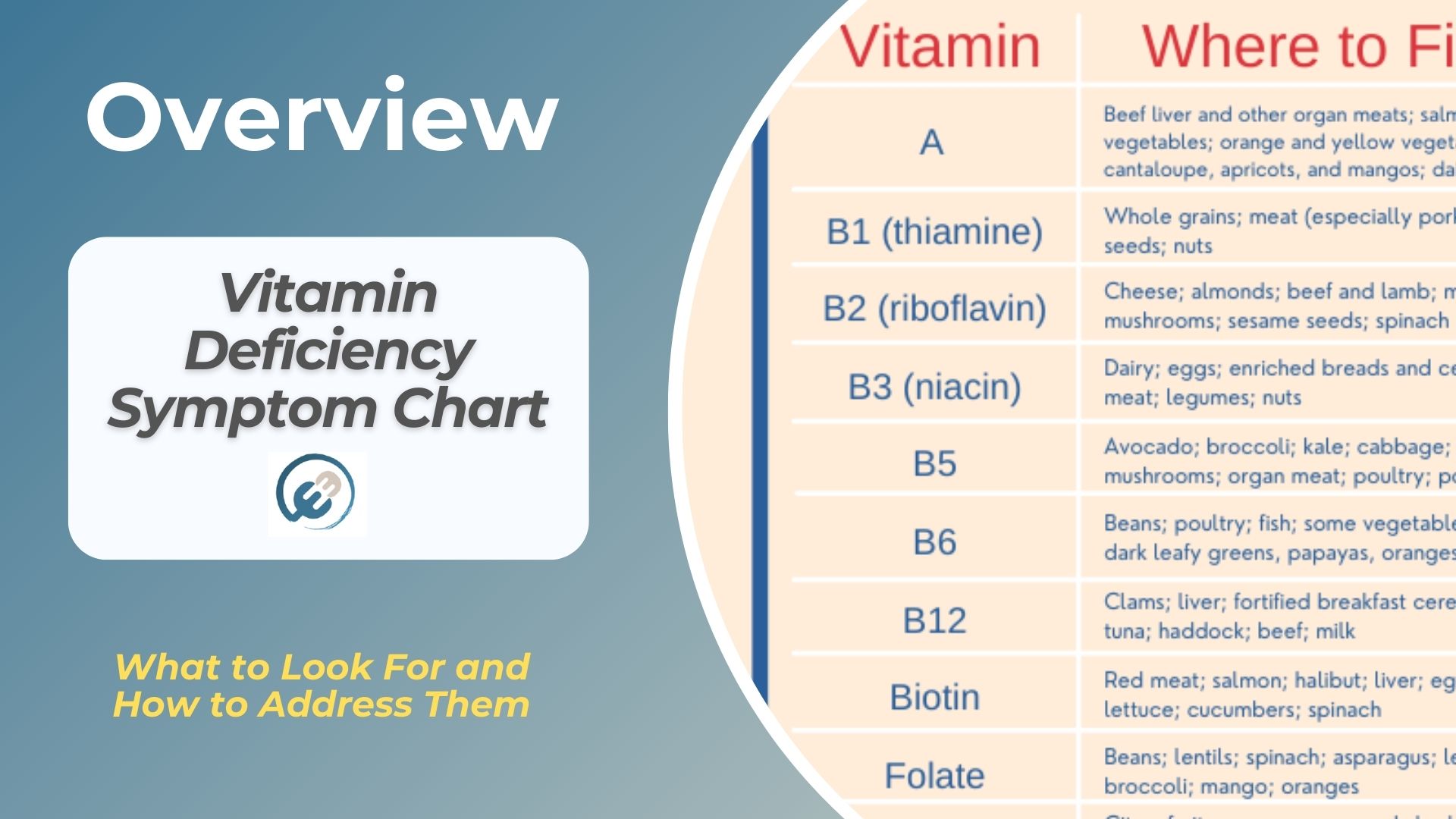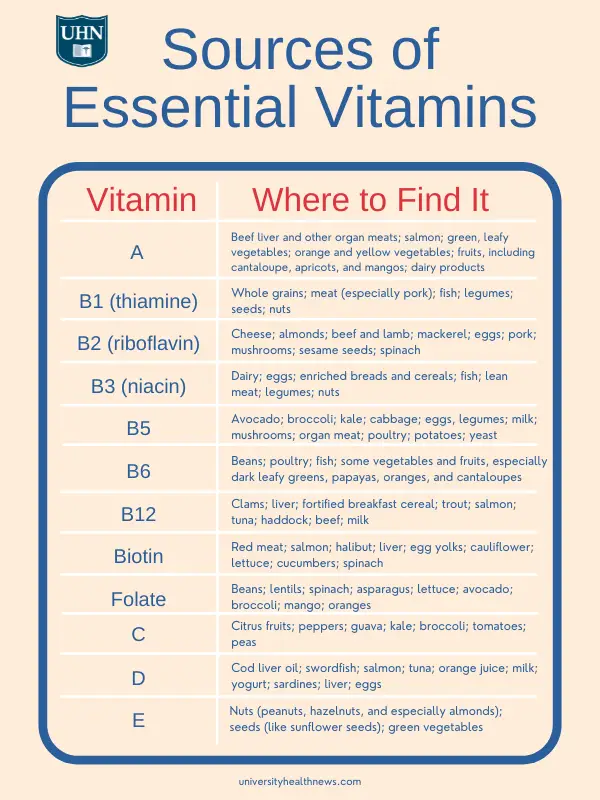Are you getting the recommended daily allowance of vitamins and minerals? If not, you could be setting yourself up for deficiency symptoms.
Vitamin and mineral deficiencies can cause a wide range of health problems, ranging from mild to serious.
That’s why it’s important to be aware of the signs and symptoms of vitamin deficiencies and take corrective action as soon as possible.
In this blog post, we will discuss the most common vitamin deficiency symptoms. We’ll also provide a chart that outlines how to address each deficiency.
A Vitamin deficiency symptom
Vitamin A deficiency is a serious problem in many parts of the world. It can cause blindness and death in children, and it increases the risk of disease and death in adults.
The most common symptom of vitamin A deficiency is xerophthalmia, which is a dryness and inflammation of the conjunctiva (the membrane that covers the white part of the eye).
Deficiency can also cause night blindness, which is the inability to see in low light. Other symptoms include dry skin, hair loss, and weaken immunity.
Vitamin A deficiency is usually caused by a lack of access to foods that are rich in vitamin A, such as meat, eggs, and dairy products.
It can also be caused by a lack of access to Vitamin A supplements, or by a condition that prevents the body from absorbing Vitamin A.
B Vitamin Deficiency Symptoms
Vitamin B deficiencies are relatively rare, but they can cause a wide range of health problems.
The most common symptom of Vitamin B deficiency is anemia, which is a condition in which the blood is unable to carry enough oxygen to the body’s tissues.
Other symptoms include fatigue, weakness, irritability, and depression. Vitamin B deficiencies can also cause problems with the skin, hair, and nails.
Vitamin B deficiencies are usually caused by a lack of access to Vitamin B-rich foods, such as meat, fish, poultry, eggs, and dairy products.
They can also be caused by a lack of access to Vitamin B supplements or by a condition that prevents the body from absorbing Vitamin B.
Vitamin D: Fatigue, Bone Pain, Mood Shifts and More
Vitamin D is essential for strong bones and muscles, but it can also play a role in your mood, energy levels, and overall health.
A D Vitamin deficiency can cause a number of different symptoms. The most common symptom is fatigue. You may also experience bone pain, muscle weakness, or mood shifts.
D Vitamin deficiency is usually caused by a lack of exposure to sunlight. It can also be caused by a diet that doesn’t include Vitamin D-rich foods, such as fish, eggs, and dairy products.
A Vitamin D deficiency can also be caused by a condition that prevents the body from absorbing Vitamin D.
If you think you may be Vitamin D deficient, it’s important to see a doctor. It can be treated with supplements and/or lifestyle changes.
Vitamin C Deficiency Symptoms
It is one of the most common vitamin deficiencies in the world. It can cause a wide range of health problems, including scurvy, which is a disease that causes bleeding gums, fatigue, and joint pain.
Other symptoms of Vitamin C deficiency include dry skin, easy bruising, and slow wound healing. Vitamin C deficiency can also weaken the immune system, making you more susceptible to infections.
Vitamin C deficiency is usually caused by a lack of access to Vitamin C-rich foods, such as citrus fruits, tomatoes, and leafy green vegetables.
Vitamins and Cancer
There is a growing body of evidence that suggests that certain vitamins and minerals may help to prevent cancer.
Vitamin A, Vitamin C, Vitamin D, and Vitamin E have all been shown to play a role in cancer prevention.
Similarly, selenium, copper, and zinc have also been shown to reduce the risk of cancer.
While more research is needed, the evidence so far suggests that vitamins and minerals may help to protect against cancer.
If you are interested in reducing your risk of cancer, talk to your doctor about Vitamin A, Vitamin C, Vitamin D, Vitamin E, selenium, copper, and zinc supplements.
Vitamin deficiencies can lead to cancer because they weaken the immune system, making the body more susceptible to infection.
Vitamin A, Vitamin C, Vitamin D, and Vitamin E have all been shown to play a role in cancer prevention. Similarly, selenium, copper, and zinc have also been shown to reduce the risk of cancer.
Iron: Fatigue, Shortness of Breath, Cold Hands and Feet, Brittle Nails and More
Iron is a mineral that is essential for good health. It plays a role in the production of hemoglobin, which is a protein that carries oxygen in the blood.
Iron deficiency can cause a wide range of symptoms, including fatigue, shortness of breath, cold hands and feet, brittle nails, and more.
Iron deficiency is usually caused by a lack of iron in the diet. It can also be caused by blood loss, such as from heavy menstrual bleeding or gastrointestinal bleeding.
Burning sensation in the feet or tongue
A burning sensation in the feet or tongue can be a symptom of Vitamin B12 deficiency. It’s a water-soluble vitamin that plays a vital role in the function of the nervous system.
Vitamin B12 deficiency can also cause fatigue, memory loss, and depression. It is usually caused by a lack of Vitamin B12 in the diet.
This is found in animal-based foods, such as meat, poultry, fish, eggs, and dairy products. If you don’t eat animal-based foods, you may be at risk for Vitamin B12 deficiency.
For individuals concerned about Vitamin B12 deficiency, especially vegetarians and vegans, exploring supplementation is a viable option. One of the most effective supplements in combating this deficiency is dynamic lipotropic b12, which not only aids in overcoming the shortfall but also supports liver health and helps in the process of fat metabolism. It also improves energy levels and lowers the risk of heart disease.
Folate: Fatigue, Diarrhea, Smooth Tongue and More
Folate is a water-soluble vitamin that is found in leafy green vegetables, legumes, nuts, and seeds. It plays a vital role in the production of red blood cells and the synthesis of DNA.
Folate deficiency can cause a wide range of symptoms, including fatigue, diarrhea, smooth tongue, anemia, and more. Folate deficiency is usually caused by a lack of folate in the diet.
Severe hair loss
Severe hair loss can be a symptom of Vitamin A deficiency. Vitamin A is a fat-soluble vitamin that plays a vital role in the function of the immune system.
It can also cause dry skin, night blindness, and an increased susceptibility to infections. Vitamin A deficiency is usually caused by a lack of Vitamin A in the diet.
It is found in animal-based foods, such as meat, poultry, fish, eggs, and dairy products.
If you don’t eat animal-based foods, you may be at risk for Vitamin A deficiency. If you are experiencing severe hair loss, talk to your doctor about Vitamin A supplements.
Where to Start

If you think you may be deficient in any of the vitamins or minerals mentioned above, talk to your doctor.
They will be able to give you a blood test to check for deficiencies and recommend supplements if necessary.
You may also get a vitamin deficiency online blood test that can assist you in identifying your deficit.
Eating a healthy diet rich is the best way to get the vitamins and minerals your body needs. Eat plenty of fruits, vegetables, whole grains, and lean protein.
I strongly urge that you eat iron rich foods high in vitamins to help prevent vitamin deficiency, or take a multivitamin for general health.
Vitamin Deficiency Symptom Chart Summary
While we’ve only touched on a few of the many possible vitamin deficiencies, this chart provides a general overview of what to look for and how to address them.
If you are experiencing any of these symptoms, it is important to consult with your doctor and get proper testing done.
Many times, minor tweaks or changes in your diet can correct a vitamin deficiency before it becomes too serious.
And don’t forget to eat foods rich in vitamin and fresh fruits.
Stay healthy and happy by ensuring that you are getting all the nutrients your body needs!
What other symptoms would you add to this list? Let us know in the comments below!



